
Know The Champion: Magnus Carlsen
The 2021 FIDE World Championship title match between GMs Magnus Carlsen and Ian "Nepo" Nepomniachtchi promises to excite fans of the game in advance. Like all major sporting clashes, there are a number of easy angles for spectators and pundits to argue.
It is vital to remember that "expert" predictions are rarely more than hot air, and even hindsight often produces equally misguided conclusions. The only thing that truly matters is what kind of decisions the players make for match strategy, and how they happen to pan out. They are the only real experts, and they have to live with the outcomes of the decisions they must make.
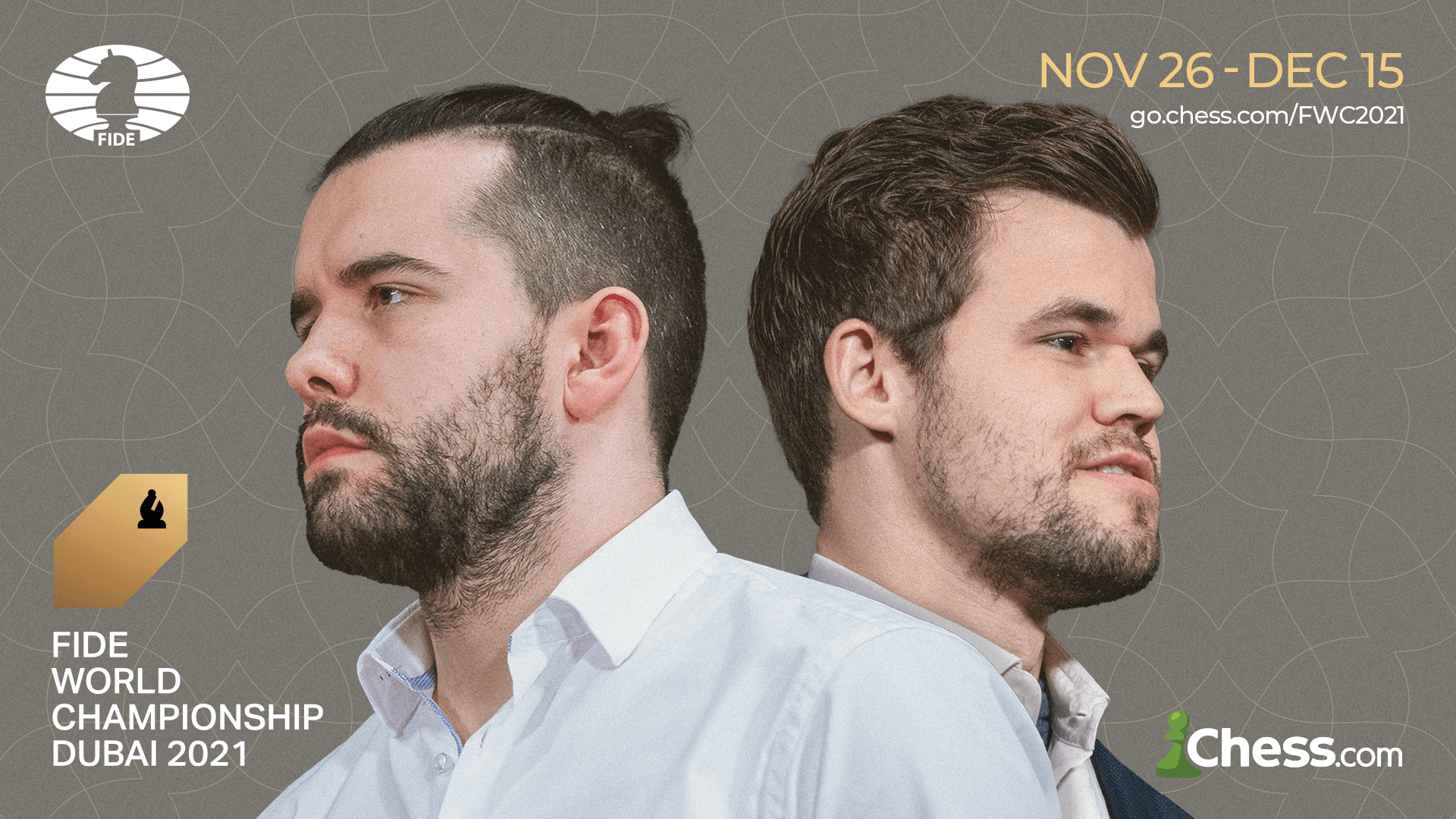
I think the real fun of exploring an event of this magnitude is to dig a bit deeper into the various factors that might influence the result, consider some history, try to ignore the obvious, and contemplate a few hidden details.
- An Uneasy Crown?
- Magnus, The Tie-Breaker
- A Taste Of Mortality
- Narratives
- The Same, Only Different
- A Taste For New Rules
- The Obvious Storyline(s)
- The Anti-Carlsen?
- My Offbeat Tip To Influence Your "Betting"
- Who To Root For?
- The Jante-Zlatan Scale
An Uneasy Crown?
Historical context always helps us understand and feel a bit more informed about what we think will happen. The Norwegian world champion has held the title since 2013, when he toppled the much older Indian legend GM Viswanathan Anand in the latter's hometown of Chennai, fulfilling what many had seen as an inevitable destiny.
Magnus has arguably always been prouder of establishing himself as the world's highest-rated player, a feat he accomplished in January 2010 at the tender age of 19. He jockeyed with the incumbent for the number one spot before taking over at the top in July 2011, and he has not lost his footing at the summit since.

His peak rating has twice neared an unthinkable 2900, and his baseline has almost never been approached in the past decade. When the curtain goes up on the 2021 duel, Carlsen's rating dominance may be unusually stark, with no other humans over 2800 at the time of writing and Magnus continuing to inhabit the stratosphere some 50+ points above this magic number.
It is easy to forget Carlsen's historic priorities, even if he has regularly raised the subject of not defending his title, always giving the impression he feels it is more trouble than it is worth. The problem is that the type of people who are remorselessly driven and endlessly motivated to be the best, find it extremely difficult to give something away that they have won.
But Carlsen's offhand attitude towards trying to win the title in 2013—"because, why not?"—is clearly backed up by his actions many years ago. In 2011, his distaste for the convoluted road to a title match was so strong that he dropped out of the qualification cycle, content with "just" being the numerical number one. He has always said what he thinks and did what he says, and these habits always create tension and suspense around his relationship with the crown.
Carlsen won and defended his title versus Anand fairly convincingly in 2014, but the two matches that followed had very different narratives, leading observers to overly simplistic conclusions.

Magnus, The Tie-Breaker
The final act in the past two title matches left a lasting impact on spectators. The challenges of Russian GM Sergey Karjakin and the USA's GM Fabiano Caruana both ended in 6-6 deadlocks, followed by comfortable rapid tiebreak victories for Carlsen. Despite their similarities, I believe the psychological backdrop of the matches were hugely different, and having covered title matches for soon 40(!) years, I also believe that these mental and off-the-board factors are the most interesting aspects of these intense duels, even if we have to speculate.
A Taste Of Mortality
I don't think I am going way out on a limb if I argue that the Carlsen narrative for the match against Karjakin was one of hubris. The Norwegian was a clear favorite, and while supreme self-confidence is an essential trait of a champion mentality, there is always the danger of an asset becoming a liability. While Carlsen and his team were clearly prepared for the match, there was something overly relaxed about the atmosphere as the match unfolded.
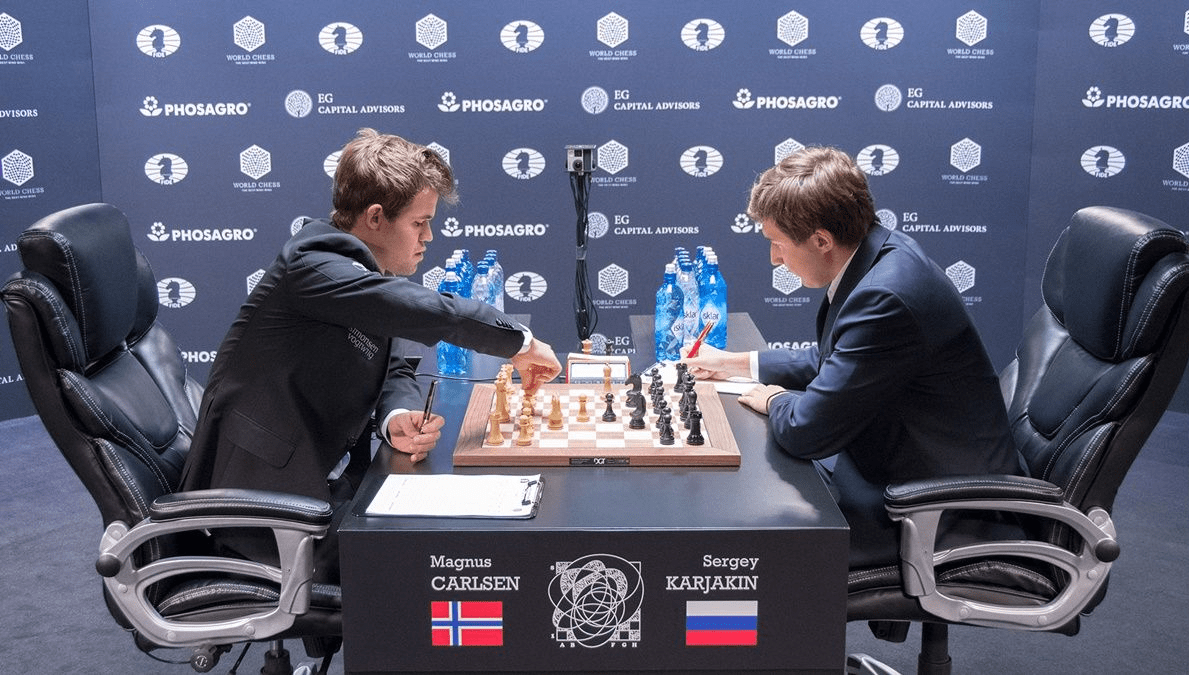
The most recent title matches are, by historical standards, quite short—half the length of what was arguably the typical distance of 24 games, and experiments with an unlimited contest to six wins resulted in terrifying marathons: 32 games between Karpov and Korchnoi in 1978, and then 48 games between Karpov and Kasparov in 1984—a match that didn't even finish. With attention spans shorter and running costs higher, it was easy to entertain arguments for a truncated format. After all, those long-winded affairs often included a long series of acclimatizing draws and a flurry of activity near the end.
Unfortunately, shortening the match doesn't always mean that a peaceful nervous start disappears. Even more significant, however, is the constant evolution of chess engines and their immense impact on opening preparation. Discussing this with today's elite players, it is almost impossible for mortals to grasp just how thorough top-level preparation is. The ability to extract any meaningful advantage and to surprise an opposing team of analysts is rapidly vanishing. Converting whatever meager superiority they can produce is even harder, so this is rarely dangerous for a titan playing at slow time controls.
This means two things: the defending champion needs to push and strike early, while the debutant is coping with the nerves of the occasion. The odds of succeeding at this are becoming ever harder, and the rate of draws is likely going to remain very high. (The 2021 match makes token recognition of this state of affairs by extending the contest to... 14 games.)
The importance of this basic scenario played out in the early stages of the Carlsen-Karjakin match, with the challenger wobbling badly, but with the champion oddly sloppy in converting in the face of dogged resistance. As the Russian earned his nickname of "Minister of Defense" with a long series of draws, Carlsen became more and more visibly frustrated, finally imploding totally with White in the eighth game, as he completely overextended in an emotional bid to win by sheer willpower. With Karjakin looking invincible, Carlsen had to grapple with what would presumably be the darkest moment of his career: facing embarrassment and the painful loss of the title he wasn't sure he wanted in the first place, but definitely didn't want to surrender now.
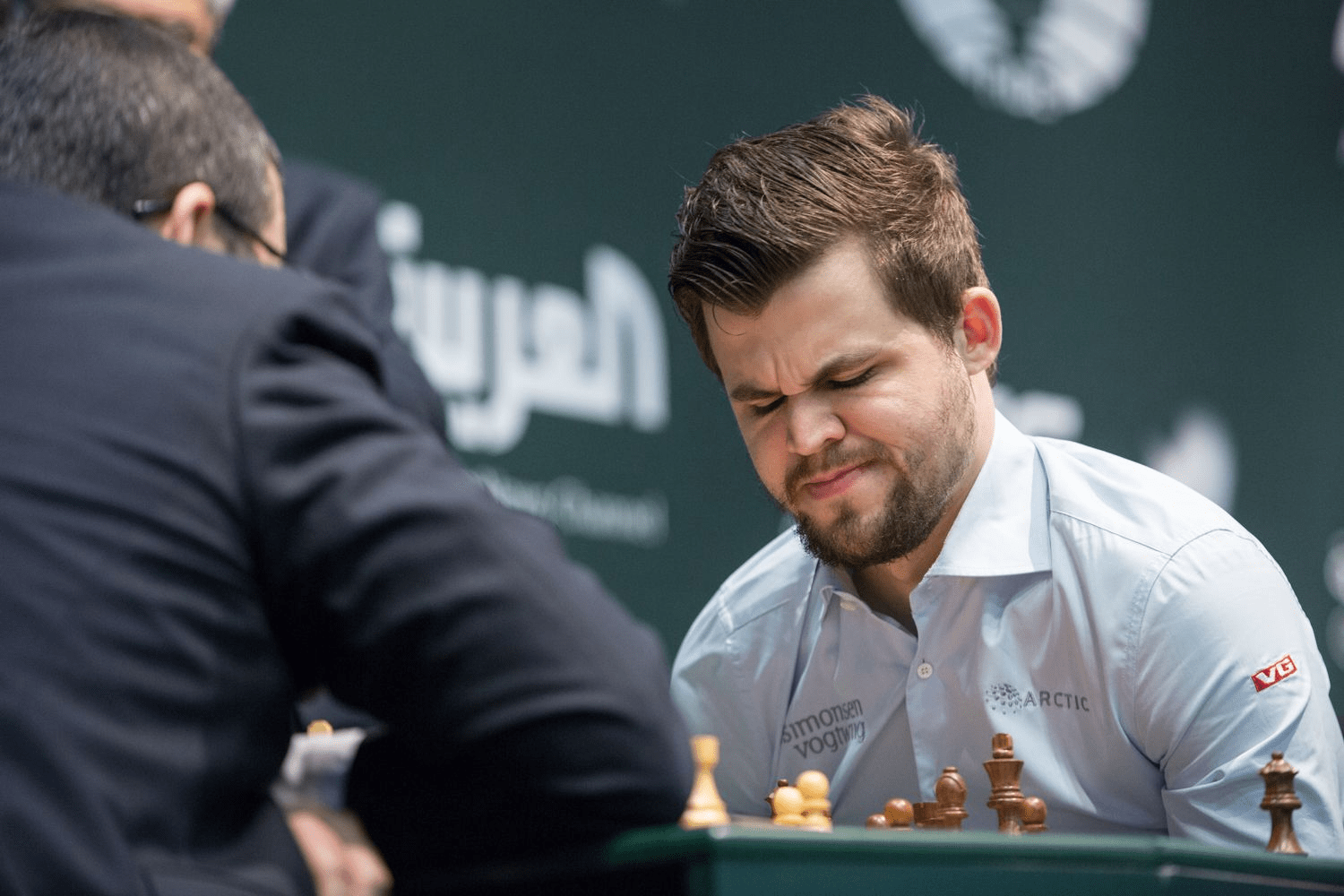
Narratives
Even if we are examining the champion and his relationship with the title, it is always worth musing about alternative angles and storylines. To Karjakin, and presumably Russia as well, this was shaping up to be a saga of redemption. After all, it was Karjakin who had originally been the bigger prodigy, and once seen as a likely champion before the astonishing ascendancy of the Norwegian. And, of course, this narrative sounds a bit familiar today.
We all know that Magnus somehow managed to tie the match, and then produced the shocking novelty of burning his final game with White in round 12, playing a quick draw and sending the match to rapid games. The brilliance of this waste of his last classical game was that Magnus gained a few days of rest while Karjakin had to brace himself for the final assault that never came. This kind of calculated pragmatism may well have delivered the psychological and physical refreshment needed to defend the title.
The Same, Only Different
It's hard to argue that the Carlsen-Caruana match was tough and exciting when all the games were drawn, but I have and I will. The first and final games were key moments, both of which Carlsen played with Black, and both of which featured sharp, successful preparation.
The first game resulted in the biggest miss of the match, with Carlsen inches away from a commanding win. This would influence and also sum up the entire contest: the need to strike early, the choice to fight sharply with Black, and the nervousness of a fumbled opportunity.
Magnus had more than his title on the line in the London 2018 defense. The convergence of a spell of his poor form, and Fabiano's extended string of successes meant that the slenderest of victories by the challenger would mean dethronement as world champion and a new top-rated player—a potential total erasure of nearly a decade of superiority.
Game one was pivotal—Caruana avoided a possibly shattering start, and Carlsen, perhaps also scarred by the memory of the previous match, became extremely wary of a rival he deeply respects. When he chose to draw game 12 from a position of strength, the grumbling public had more to complain about than just a lack of decisive results. "This guy just wants to show off his rapid skills, is this any way to decide a classical match, blah, blah, blah." And yes, the tiebreak was a demolition.
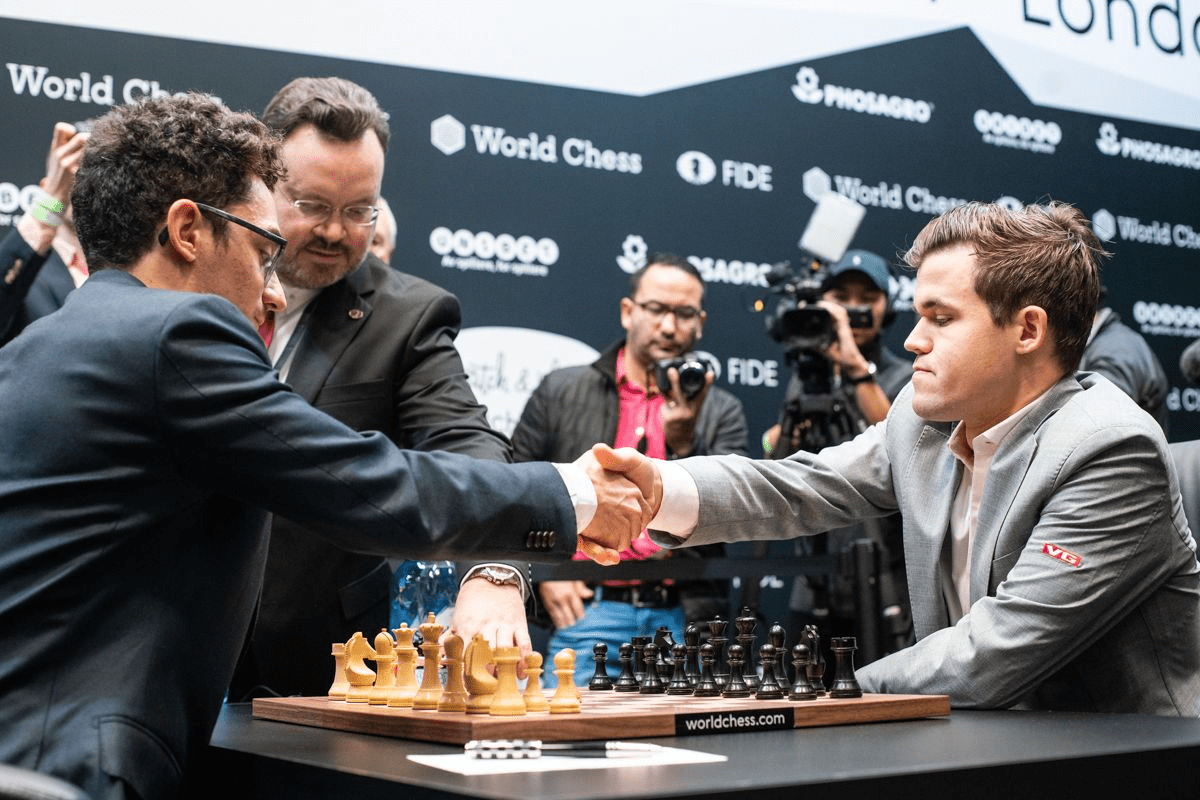
A Taste For New Rules
Magnus has also voiced his frustration with the format of the qualification and title match as champion, and the clear challenges posed by the ever-increasing difficulty of winning games at slower time controls in these shorter title bouts. His favored solution is to play more games, faster, in order to produce more decisive results. He is convinced that rapid chess will become more important and considered a format of a round of classical being replaced by a set of faster games as a more suitable way of generating an exciting and viable title match.
Skeptics have raised an eyebrow or two about this idea since Magnus has been deciding his title defenses in rapid games. The two online tours organized by Magnus and his group during the Covid pandemic have used varieties of this format, and they have been a kind of testing ground for what he sees as the future. And, while Magnus emerged victorious in both tours, he told me that he does not see himself as the real champion of the discipline yet. He claims he hasn't been as dominant as he thinks a champion should be—in case you needed an illustration of his killer mindset.
In the meantime, classical chess is presumably still here to stay, and there is a new challenger in town. And in regard to discussions of speed and eventual tiebreaks, Nepo is probably the most dangerous yet.
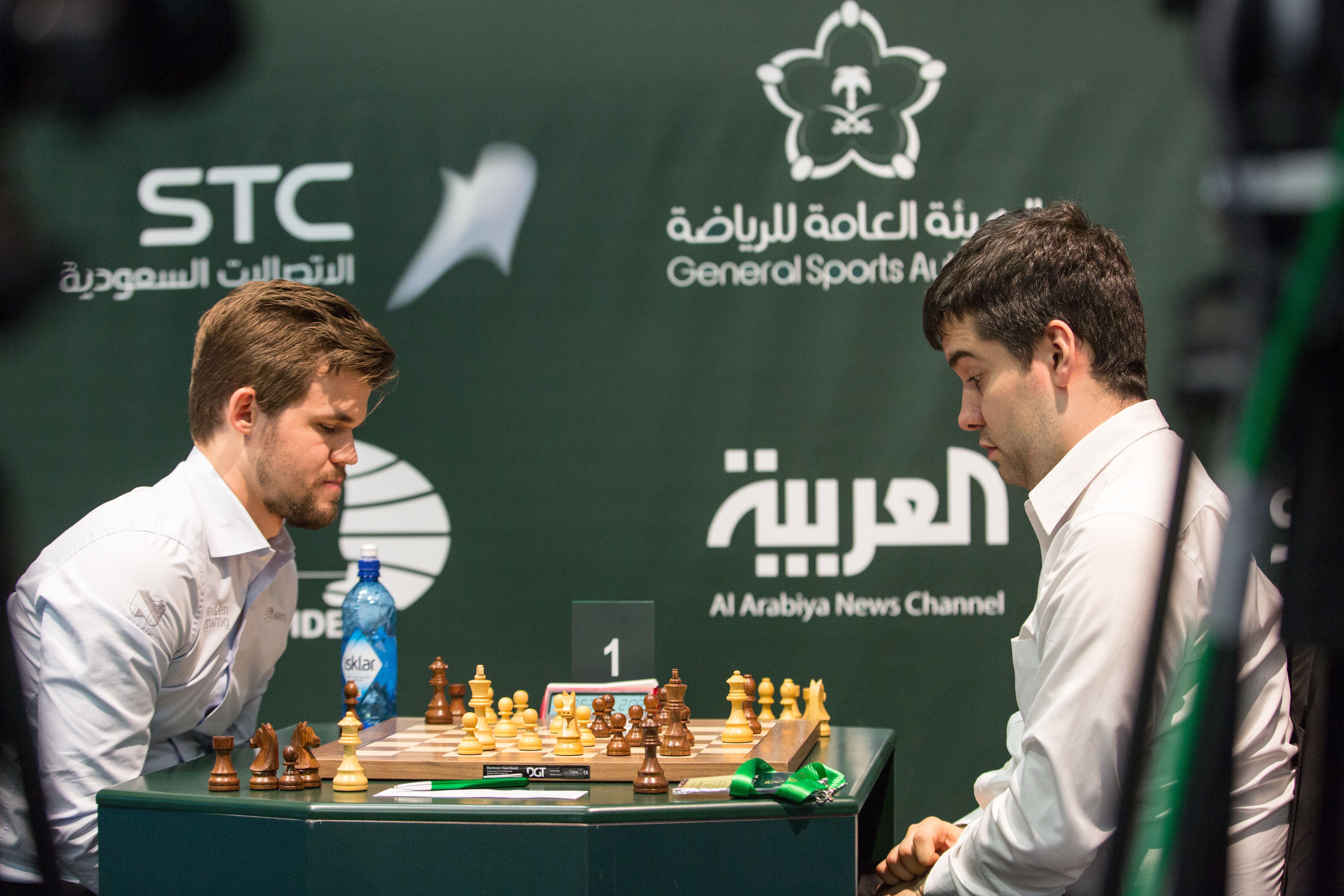
The Obvious Storyline(s)
While we were waiting for a challenger to emerge from the pandemic-hit Candidates Tournament, there was a temporary distraction about Carlsen's age. When he hit 30, he suddenly stopped winning the online tour events and wobbled to a sixth-place finish when returning to the physical board at Tata Steel in January 2021. Although OTB chess has been severely limited, Magnus revived his online fortunes and then finished forcefully to win Norway Chess in Stavanger with physical pieces as his main pre-match warm-up. What should finally put the age angle to bed is the fact that the Russian challenger is only half a year older.
Nepomniachtchi is also roughly half a year younger than a certain Karjakin, and that creates an echo and more dramatic version of the Russian redemption tale.
There are a couple of plot wrinkles that make "Russian Redemption 2" a more fascinating tale than the original. Nepo and Magnus were direct rivals during World and Euro events for Under-12s, and the Russian won both of these titles, edging out Carlsen on tiebreak for the World U-12 in 2002. A tremendous interview (in Norwegian) with a young Magnus at the end of that year revealed a few amusing details about their relationship back then.
Magnus admitted that Ian was good, but he wasn't overly impressed, and it was also clear that they had a kind of natural rapport.
Spot the future world title challengers! World U12 C'ship, 2002 #classof1990
— David Howell (@DavidHowellGM) April 27, 2021
(R to L: Nepo, Carlsen, some English patzer, Andreikin, Nguyen, Wei Chenpeng. Also participating were MVL, Le Quang Liem, Saric, Kuzubov, and many other super-GMs)
Thanks @GMastrokoukos for the pic! pic.twitter.com/SEpFXLMnCE
According to young Magnus, they played billiards as well and Ian cheated when he was losing. They seem to share an impish sense of humor, and while Ian was taking a very slow route to establish himself in the world elite, they were on friendly enough terms to work together, and apparently collaborated a bit on Magnus' prior title match preparation.
So there is a lot more to this faceoff than another long-awaited comeback story. The old-fashioned East-West rivalry also includes the burying, at least temporarily, of an unlikely friendship.
The Anti-Carlsen?
The other angle you can expect pundits to promote is the clash of styles. Nepomniachtchi is an aggressive, dangerous, impetuous risk-taker, a clear contrast to Carlsen's trademark logical harmony and iron technique. Plus, the Russian not only established a plus score against the champ in their childhood days but has also remained a tricky customer, to this day having a better lifetime record against Carlsen in classical play.
Add these considerations to just the overall greater sense of danger that the Russian challenger generates, and you should find plenty of people that think this match will produce more fireworks, and that Carlsen's obvious advantages might mean little against a genuine bête noire of an opponent.
There is, however, a high likelihood that the magnitude of the occasion will bring out a strong pragmatic streak in the challenger. Carlsen has predicted that we will see a more solid and cautious Nepomniachtchi in Dubai, which might take a lot of the edge off of the vaunted clash of styles. It is indeed very rare to see a challenger throwing caution to the wind. If you want a more statistical analysis, you can have a look at this article.

In my mind, the conundrum of choice is this: Nepomniachtchi may be the most dangerous man in a tiebreak so far, but if he is really willing to take risks and make the match more exciting then he is probably a lot less likely to draw the classical stage of the match.
My Offbeat Tip To Influence Your "Betting"
Even if the modern title match has lost a lot of the historical sense of a marathon, one that reputedly took years off the lives of former challengers and titleholders, it is still probably the most grueling event of a player's career.
In the olden days, it was part of the pre-match coverage to see photos of the combatants working out hard as part of their preparations. I remember vividly the images of an elder GM Viktor Korchnoi hitting the gym and jogging ahead of his panting and wheezing team of younger English seconds. Magnus has vowed that he will shake off the long pandemic doldrums and be in peak physical condition for his 2021 title defense. I intend to factor in visible physical changes to assess the challenger's chances.
Won both 3v3 footy games today. Fantastic feeling.
— Magnus Carlsen (@MagnusCarlsen) September 15, 2021
Also won the chess. Was ok. pic.twitter.com/JDPzbokw0B
Ian has always tended to give a bohemian impression at the board. How seriously he prepares for the unique physical and mental exertions involved in a title match will, I think, be a key factor. One should already note that Nepo looked visibly thinner in Stavanger for the Norway Chess event.
Who To Root For?
World championship matches have evolved a lot. Just in the post-World War II era, we have gone from isolated internal Soviet affairs to the geopolitical age. GM Bobby Fischer's combination of fighting to secure a fat purse, and "battling single-handedly against the Soviet juggernaut" sparked the first wave of wider interest in the game's top prize and players. Korchnoi would freshen up the political angle by defecting before his bouts with GM Anatoly Karpov. He even upped the ante by introducing yogurt controversies and parapsychologist angles, a level of weirdness that we haven't really seen since. Even the Kasparov-Karpov match was billed as a "glasnost vs. hardliner" battle.
Since then things have calmed down, and it would be hard to argue against Carlsen. Starting with his stint as a fashion model for G-Star Raw, he has been the catalyst and driver for a most remarkable, and frankly incredible, transformation. A transformation that has now spiked with the success of Netflix's The Queens' Gambit and the champion's own online tour: chess has become mainstream, and it has become cool.

This angle contains a number of interesting ingredients to consider for fans. Toppling the champ will of course mean drama and change, and change means excitement. It would also have a huge potential impact to return chess to its former exalted status in Russia if they once again have a world champion. After generations of total dominance, how strange it must be to see the game lose its luster there, and even odder to see it on live prime-time TV across Norwegian households.
But you don't have to be Norwegian to wonder if the game might lose a bit of its recent celebrity gloss if Magnus were to be sidelined. As veteran English chess journalist Leonard Barden, often a "Magnus-skeptic," recently wrote in the Guardian: "Whether or not history assesses Carlsen as the greatest of all time, he has already done as much or more to popularise chess globally than any other previous world champion." So, that's another thing to consider.
The Jante-Zlatan Scale
There have been a few hints in this article of a champion's mindset. Magnus has had an eerily good understanding of how to cultivate a confident and successful attitude since he was very young, and there are collections of his quotes from early on that very clearly indicate this.
His sporting psychology is nearly as impressive as his chess fluency, and he is on record as saying that his quantum leap from obvious talent to world-beater was due to a conscious understanding and decision that to do so, it was necessary to become mentally stronger than the existing elite.
To give some cultural context, the Scandinavian range of public confidence is probably best summarized as the Jante-Zlatan scale, with the modest, egalitarian "Law of Jante" at one end (and also arguably the default setting) and the over-the-top whimsical bravado of Swedish footballer Zlatan Ibrahimovic at the other.
Magnus doesn't go overboard, but he is not going to pull punches. Like most top performers, he is his own harshest critic and has incredibly high standards to satisfy. I don't believe you become a dominant champion by indulging in false modesty, though there have been a few who prefer to put on a humble front. Magnus will firmly express his confidence.

I recently asked Magnus if he felt that his experience with long title matches might be his biggest advantage this time, and got a very blunt answer: "No, my biggest advantage is that I am better at chess."
My biggest advantage is that I am better at chess.
— Magnus Carlsen
And there is no better way to set the stage for this showdown.

